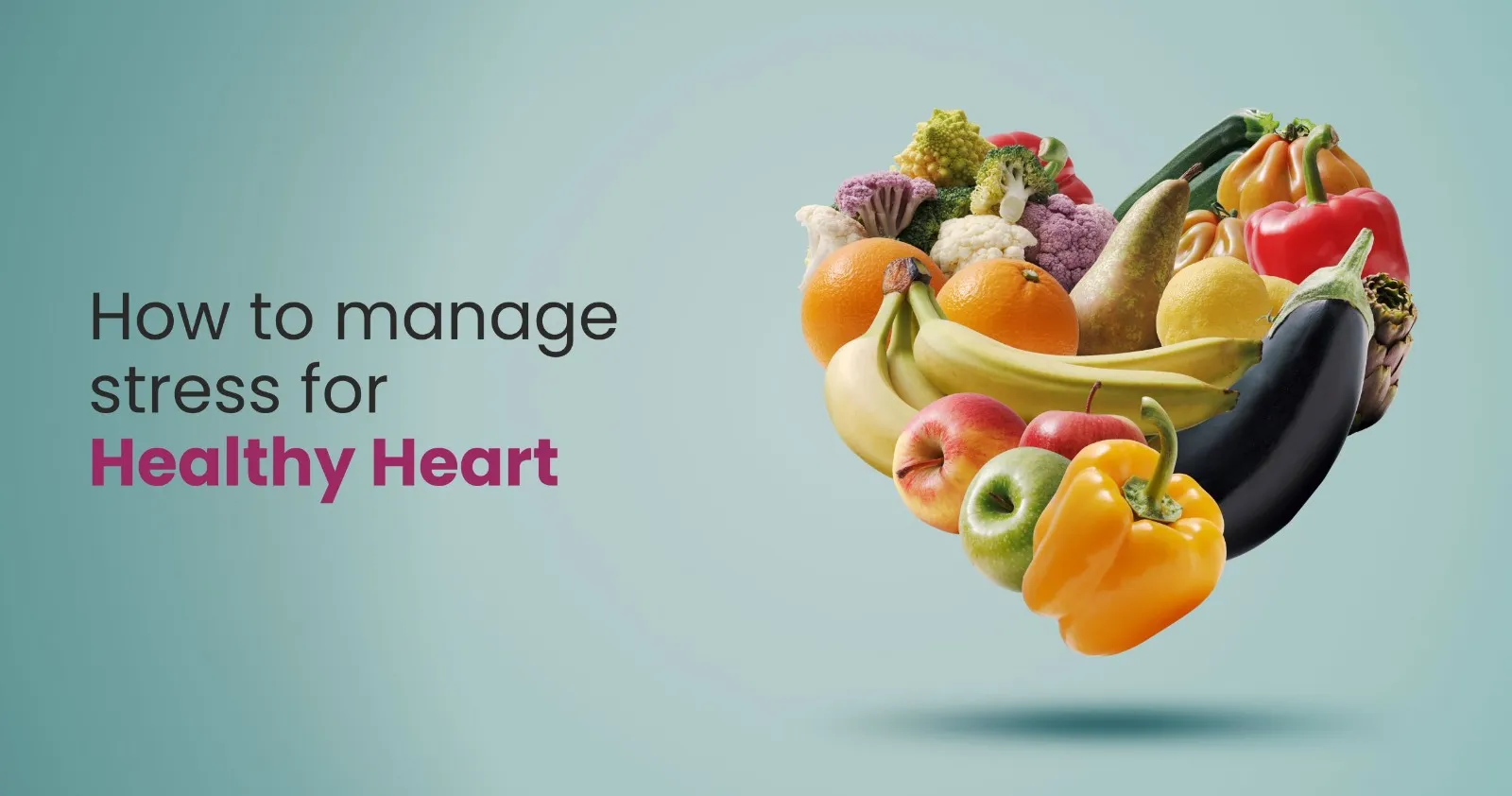How to Manage Stress for a Healthy Heart
Oct 10, 2023

In today’s fast-paced world, stress has become a practically unavoidable part of our lives. From work pressures to personal challenges, stress can come in various forms and significantly impact our well-being. While occasional stress is normal, chronic stress can have serious consequences on our health, particularly our heart health.
If you are wondering how stress is linked to heart health, stress is indirectly linked to cardiovascular health. Stress can cause inflammation, leading to high blood pressure and reduced good or DHL cholesterol. These conditions can impact your heart. Moreover, stress can cause insomnia, force you to make poor dietary choices, and cut down on your exercise regime, which will indirectly impact your heart negatively in the long term. Let us explore tha causes and risk factors of stress and to understand the importance of managing it for a healthy heart.
What is the cause of stress?
a multitude of factors, both external and internal trigger stress can and identifying the root causes of stress is essential for effective stress management. Here are some common causes of stress which can impact your heart health:
- Work-related stress: Excessive workload, tight deadlines, conflicts with colleagues, and job insecurity can lead to chronic stress for many individuals.
- Financial stress: Struggling with debt, job loss, or financial instability can be a major source of stress for individuals and families, leading to poor heart health.
- Relationship issues: problems in personal relationships, such as conflicts with family members or partners, can cause emotional turmoil and chronic stress.
- Health concerns: Dealing with chronic illnesses, health scares, or caring for a loved one with health issues can be emotionally draining.
- Major life events: Events like divorce, moving to a new city, or the loss of a loved one can generate considerable stress.
Risk Factors Associated with Stress and Heart Health
Stress can have a profound impact on cardiovascular health, and several risk factors contribute to this connection:
- Increased blood pressure: Stress triggers the release of hormones like adrenaline, which can cause a temporary spike in blood pressure. Over time, chronic stress can contribute to persistent high blood pressure, which is a significant risk factor for heart disease.
- Elevated cholesterol levels: Prolonged stress can lead to unhealthy eating habits, including overconsumption of high-fat and high-sugar foods, which can raise cholesterol levels and increase the risk of heart disease.
- Obesity and weight gain: Stress can disrupt sleep patterns and lead to emotional eating, contributing to weight gain and obesity, both of which are linked to heart problems.
- Smoking and excessive alcohol consumption: Some individuals turn to smoking or alcohol as coping mechanisms for stress, but these habits can be harmful ta heart health.
- Inflammation: Chronic stress can trigger inflammation in the body, associated with atherosclerosis.
 It is a condition in which arteries become narrowed and hardened and increases the risk of heart attacks and strokes.
It is a condition in which arteries become narrowed and hardened and increases the risk of heart attacks and strokes.
Managing Stress for a healthy Heart
Given the strong connection between stress and heart health, it's crucial to adopt strategies to manage stress effectively. Here are some stress management techniques:
- Practice relaxation techniques: Incorporate relaxation methods into your daily routine, such as deep breathing exercises, progressive muscle relaxation, meditation, or yoga. These practices can help relax the mind, decrease stress and keep your heart healthy.
- Stay physically active: Regular exercise is an excellent stress reducer. Engaging in physical activities like walking, jogging, swimming, or dancing can release endorphins, which are natural mood lifters.
- Maintain a balanced diet: Eating a nutritious diet rich in fruits, vegetables, whole grains, lean proteins, and healthy fats can provide your body with the nutrients it needs to combat stress and support heart health.
- Get adequate sleep: Prioritize sleep and create a steady sleep schedule. A well-rested body and mind are healthier and well-prepared to handle stress and heart health.
- Seek social support: Connect with friends and family who can provide emotional support during challenging times. Talking to someone you trust can lessen your stress.
- Time management: Organize your tasks and responsibilities so that you can prioritize your workload to reduce stress at work or home.
- Limit alcohol and caffeine: Excessive consumption of alcohol and caffeine can aggravate stress and affect sleep patterns. Controlling the intake of alcohol and caffeine is the key to z healthy heart.
When to See a Doctor?
Stress management techniques can be highly effective, but there might arise some instances when it's essential to seek medical advice. Here are some signs that should prompt you to consult a healthcare professional:
- Persistent chest pain or discomfort: If you experience chest pain or discomfort continuously, it could be a sign of a heart problem, and immediate medical attention is crucial.
- Severe anxiety or panic attacks: If you have recurrent panic attacks or overwhelming anxiety that interferes with your daily life, consult a mental health professional.
- Uncontrolled blood pressure: If you have high blood pressure that remains uncontrolled despite lifestyle changes and medications, consult your doctor for further evaluation and management.
Summing Up!
Stress is an unescapable part of modern life, and its impact on heart health should not be underestimated. By understanding the causes, risk factors, and consequences of chronic stress, as well as adopting effective stress management techniques, individuals can protect their hearts and overall well-being. Remember that seeking medical advice when necessary is essential, and with the right support and lifestyle changes, you can manage stress and maintain a healthy heart.
Diagnostic reports play an important part in properly diagnosing the medical issue. That's why Apollo Diagnostic is your health partner in ensuring you get high-quality reports in the comfort of your home as earliest as possible. From CT Scans to complete blood count reports, we have every test that you require to analyze your health. Visit our website or book an appointment at our nearest centre.
Related Blog Post
Blog Categories
- Child Health
- Mens Health
- Women's Health
- Mental Health
- Health Myths & Facts
- Fitness
- Nutrition/Recipes
- Remedies
- Weight Management
- Stress Management
- Health Supplements
- Addiction Management
- Disease Management
- Allergy
- Anemia
- Arthritis
- Asthma
- Autoimmune Diseases
- Blood Pressure
- Cancer
- Deficiencies
- Dengue/Malaria/Chikungunya
- Diabetes
- Eye Problems
- Heart Diseases
- Hepatitis
- HIV/AIDS/STD
- Hormonal Imbalance
- Infection/Flu/Viral
- Kidney
- Liver
- Menstrual Problems
- Pregnancy
- Skin & Hair Problems
- Stomach Ailments
- Thyroid
- Others
- Health Checkups
- Diagnostics/Pathology
- Lifestyle & Wellness
- Covid
- Medical Tests
- Cholesterol
- Health Tips
- Parent Care/Old Age
- Lungs
- Food Intolerance








